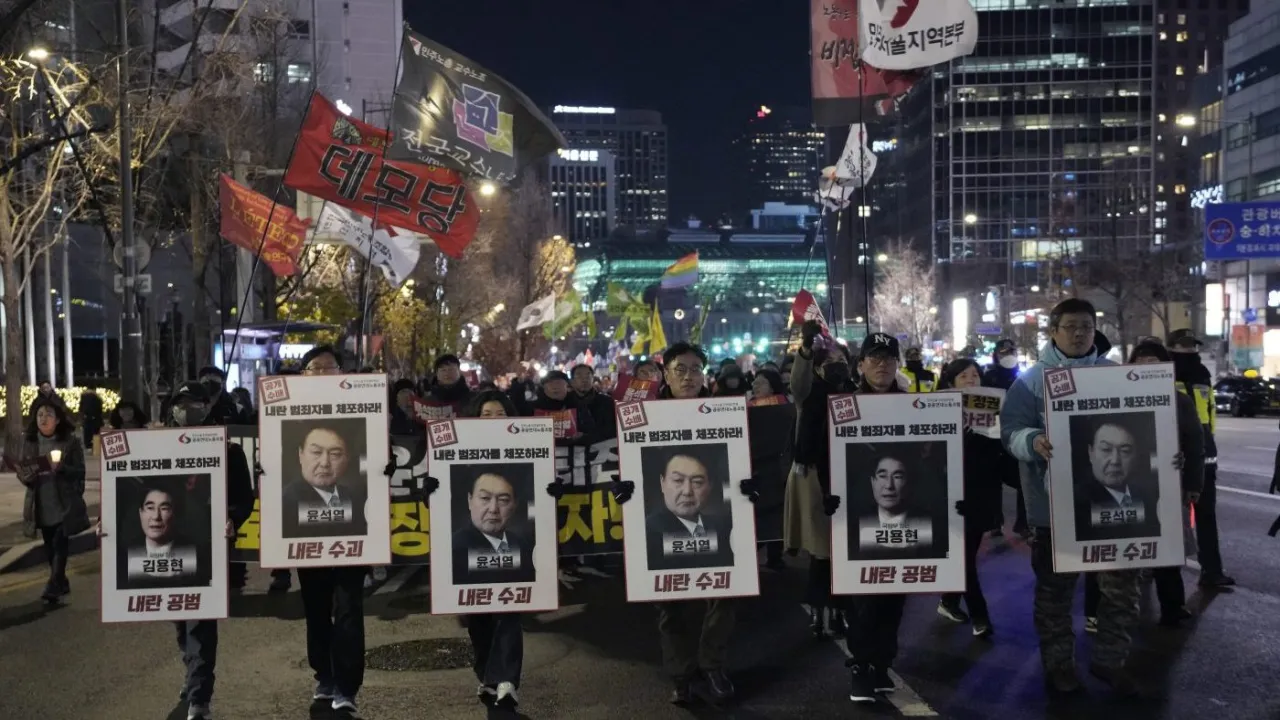Is South Korea’s legislative rejection of an autocratic president’s declaration of martial law a one-off — or an object lesson for President-elect Donald Trump?
South Korea is in political crisis. President Yoon Suk Yeol declared martial law late on Dec. 3 only to rescind his order six hours later, bowing to legislative pressure. Street protests continue, but there are almost always street protests in Korea.
Yoon claimed that martial law was needed to stop the “anti-state forces that are plundering the freedom and happiness of our people.” The pretext for the drastic measure was an unspecified military threat from North Korea and “enemies within.” The declaration of martial law was so intimidating that 190 lawmakers barricaded themselves inside the parliament as heavily armed troops stormed the building.
Trump has said he will use the military domestically to round up illegal immigrants and deport them. Evidently, he doesn’t trust local law enforcement or even ICE to do the job effectively. Tall talk or, frighteningly, a real policy that may involve brutal family separations or illegal deportations of the children of aliens born here who are American citizens by birthright?
Is Trump suggesting the equivalent of martial law? The cardinal feature of martial law is the displacement of civilian authority by the military.
The Supreme Court ruled on the concept in the landmark 1866 decision known as Ex parte Milligan: “If, in foreign invasion or civil war, the courts are actually closed, and it is impossible to administer criminal justice according to law, then … there is a necessity to furnish a substitute for the civil authority … and as no power is left but the military, it is allowed to govern by martial rule until the laws can have their free course. As necessity creates the rule, so it limits its duration, for, if this government is continued after the courts are reinstated, it is a gross usurpation of power. ”
The Posse Comitatus Act of 1878 stands for a general rule that it is unlawful for federal military forces to engage in civilian law enforcement activities — even if they are merely supplementing rather than supplanting civilian authorities, except when doing so is expressly authorized by Congress.
What Trump says he has in mind would directly violate the law.
As the court made clear in the case of President Truman’s seizure of the steel mills, the president’s powers are at their “lowest ebb,” and presidential actions are rarely upheld, when Congress and the president disagree. In that event, Congress wins. Under that decision, the president can act against the will of Congress only when a “conclusive and preclusive” grant of presidential power in the Constitution authorizes the challenged action. There is no such “conclusive and preclusive” grant involving the deportation of illegal aliens, and this is only one of the reasons why the selection of Trump’s secretary of Defense is so vitally important.
In South Korea, Yoon said the measure was necessary to prevent paralysis and domination by “anti-state” forces, but the legislature quickly voted unanimously to reject martial law. Opposition parties promptly introduced plans to vote on Yoon’s impeachment.
“The good news is the democratic institutions — the rule of law — in South Korea held,” foreign policy expert Richard Haass told MSNBC. “It’s, I think, an open question whether President Yoon can politically recover from what looks to me [like] a self-inflicted wound, and it’s just a reminder of how vulnerable American foreign policy is, for all of our economic and security commitments, to the internal dynamics of our allies.”
The events in Seoul sparked global expressions of concern. Over the past few years, Yoon has stepped up South Korea’s security alliance with Washington. U.S. Ambassador Philip Goldberg said that the U.S. was “encouraged by the resilience” the country demonstrated in withdrawing the martial law decree so quickly.
Yoon’s impeachment vote could occur as early as this week; its approval would require support from some legislators from Yoon’s party, who were not among the original sponsors. As in the U.S., if Yoon is impeached, his removal would depend on a subsequent trial. Yoon is holding on by his fingernails.
The events leading to Yoon’s stunning volte face were “set in motion well before his razor-thin [election] victory,” wrote Alan Yuhas in the New York Times, arguing that, “They were a dramatic illustration of South Korea’s bitterly polarized politics, and the deep societal discontent beneath the surface of its rising global might.”
Yoon’s apparently failed power grab should be a “cautionary tale” for Trump and his acolytes as they prepare to take office. In the Atlantic, Brian Klaas, an associate professor of global politics at University College, London, writes, “Sometimes, incompetent authoritarians botch plots to seize power. They still damage democratic institutions and norms in the process. And sometimes, the power grabs succeed — because presidential democracy is not protected by constitutions written with magical ink. Rather, it can survive its moments of greatest peril through the actions of brave people who cherish ideals more than power.”
Unfortunately, brave men and women are not seen in abundance. This is why “Profiles in Courage” was such a thin book.
And if Trump blithely disregards the precedent of South Korea and uses the military to round up illegal immigrants, martial law and all the political chaos that goes with it may soon come to America.
James D. Zirin, author and legal analyst, is a former federal prosecutor in New York’s Southern District. He is also the host of the public television talk show and podcast Conversations with Jim Zirin.



